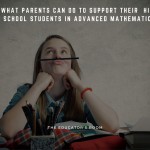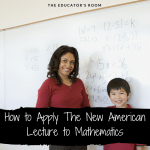The common theory is that high achieving students are the students that need the enrichment of gifted education classes. When, in reality, gifted kids come in all varieties.
First, a little background: I was a gifted education kid, my daughter is a gifted education kid, and now I’m earning my certification in gifted education.
I’ve been a teacher for 17 years, and as I studied the traits of a gifted student – beyond academic achievement – it was a wake-up call. These “new to me” traits of a gifted student have now become a checklist for me as a teacher and as a parent for my daughter.
Need for Perfection – Check.
The compulsion for a Certain Topic – Check.
Strong Sense of Curiosity – Check.
This is for all the teachers out there that have never been given a ‘checklist’ of what gifted education actually looks like.
Ability to Comprehend Material Several Grade Levels Above their Age Peers: The ability to work grade levels beyond their current grade level, and their peers of the same age, can be attributed to the student’s ability to make higher-level connections to the subject matter, the students being able to analyze the material at a more advanced level, and the possibility of extra background knowledge. (example: understanding economic decline when talking about 9/11 and the aftereffects)
Enthusiastic About Unique Interests and Topics: Gifted students may exhibit interests in unique or above grade level subjects. This might be due to their advanced creativity, imagination, level of reading (exposure to more advanced topics), or exposure to enrichment lessons. (example: extremely high interest and knowledge in mythology)
Creative Problem Solving: Gifted students show more creative ways of problem-solving due to their ability to think “outside the box.” They typically have more creative and unique interests, which means that their exposure to more creative thinking and problem solving is enhanced. (example: creating a roller coaster for engineering, and working from the top down rather than building from the bottom up)
Absorbs Information Quickly: Gifted and High Achieving students rarely need any repetition in their lessons or practice. These students are able to grasp new concepts quickly, and apply this new knowledge easily. (example: 1st grader overhearing an older grade lesson on area, and applying that knowledge accurately to benchmark testing)
Aware of World Issues: Gifted and High Achieving students typically show more knowledge of world issues including current events, politics and economic issues. These students also show an interest in expanding their understanding of these subjects. (example: knowledge of North and South Korea political situation)
Need for Precision: Gifted and High Achieving students tend to show a need for perfection and concern that their best work isn’t good enough. (example: asking to redo lessons when there is a single mistake in punctuation)
Emotional Depth: Gifted students may show an advanced level of emotional depth or understanding for others’ needs. They may also exhibit more compassion. (example: recognizing and connecting to a peer when they do not succeed in a task)
Strong Sense of Curiosity: Gifted students will have a high level of curiosity, and a need to understand the big picture. Or, to know all that is going on around them as a sense of security. (example: hearing part of a conversation and needing to have a summary of what the conversation entailed)
Quirky Sense of Humor: Gifted students will have a quirky or different sense of humor. Their sense of humor will most likely be more advanced than their peers, or they may struggle to find the humor in more “simple” puns or riddles.
Divergent Interests: Gifted students tend to have a high interest in similar themes. For example, they may be fascinated with sea life – and therefore have extended knowledge of the oceans, ocean animals, and the ecosystems of the sea.
Tendency to Complexity: Gifted students tend to make more out of a simple issue than is necessary. For example, they may overcomplicate a simple math equation or find themselves overanalyzing a common problem/solution.

Shelley Kress is in her 17th year teaching. She taught middle school for 9 years before transitioning to elementary school. She has been recognized as a Heart of Education nominee and finalist, received the Feature a Teacher Award in 2017, and was profiled on Teacher Tuesday in 2018. She has a Bachelor’s Degree in Elementary and Middle Education, a Masters of Education Degree in Early Childhood Education, a Certification in TESL education, and is a Nationally Board Certified Teacher. She resides in Las Vegas, NV with her husband and three young children.






